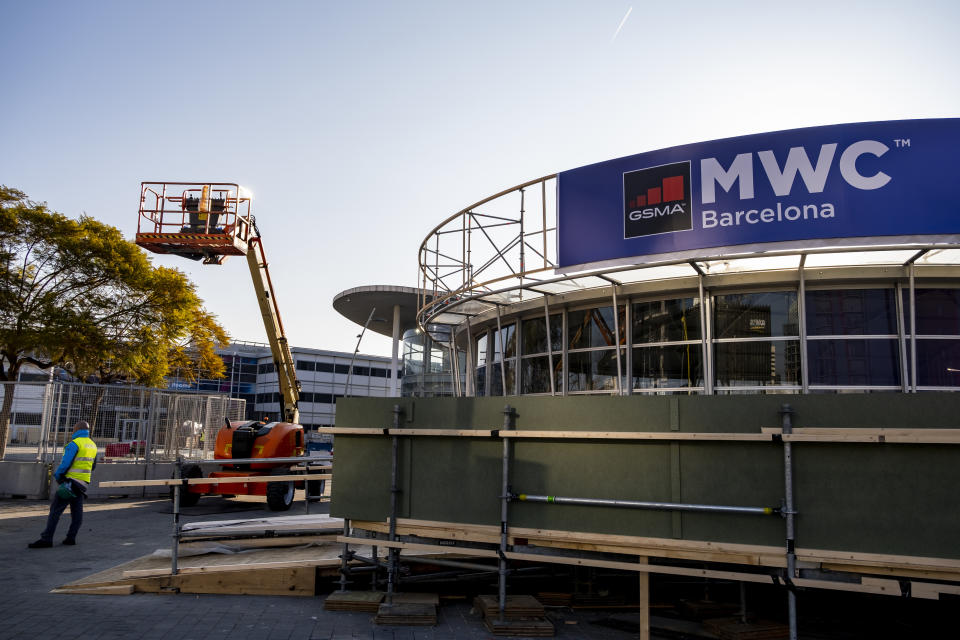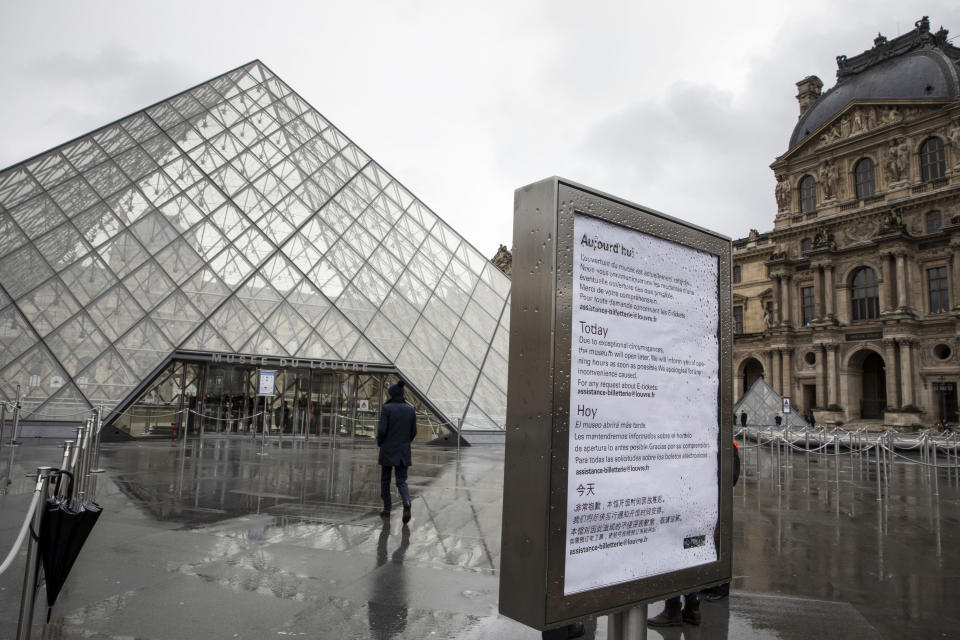Amid coronavirus panic, how one European city is trying to keep from scaring off tourists
BARCELONA — Just weeks ago, Barcelona seemed to be in the crosshairs of the coronavirus, as the world’s largest technology trade show, the Mobile World Congress, was about to open in this Mediterranean-hugging metropolis, drawing over 100,000 visitors from all over the globe — notably including thousands from China.
The mayor, Ada Colau, aware that the annual event in her city brings in as much as $500 million over four days, insisted that Barcelona was “perfectly prepared” to host the trade show and that plenty of disinfectants and medical staff would be on hand. To assuage apprehensions about the virus, conference organizers advised attendees not to shake hands at the event, adding that anybody who’d been in China over the previous 14 days would be barred from attending. Nevertheless, major exhibitors began pulling out, including Ericsson, Amazon and Sony. Conference organizers — after vainly lobbying Colau to declare a health emergency so that insurance would cover losses — canceled the trade show less than two weeks before its scheduled opening on Feb. 24, saying that due to concerns about the coronavirus it was “impossible” to hold the event.
Aghast, Colau said the cancellation was unwarranted and there’d been “no reason whatsoever” to have imposed emergency measures.
But the decision may have lessened the effects on her city from the burgeoning epidemic, at least so far. In contrast to Milan, which hosted tens of thousands of visitors for Fashion Week last week, and where authorities locked down small towns through its outlying province and now advise residents to stay at least 3 feet away from one another in public, life in Barcelona has gone on more or less as usual, if at a less frenetic pace than one would expect from this time of year, when the tourist season normally kicks off.
Health officials say that it’s hard to know if canceling the Mobile World Congress prevented a wide outbreak in Barcelona, but many locals are glad it didn’t take place — all the more since Spain, which had only two cases a week ago, is now reporting 120 cases of coronavirus countrywide, including 17 cases in Barcelona and Catalonia, its outlying province. And the vast majority of the infected in Spain had visited Milan in late February, making the Italian city the apparent epicenter of the disease that is now sweeping across the continent — especially in Italy, which now accounts for over 2,000 cases and 58 deaths — often bringing panic in its wake.

On Monday, as European officials announced that more than 2,400 cases of COVID-19 had been diagnosed and the European Union raised the risk level of contracting the disease from “low-to-moderate” to “moderate-to-high” across its 27 member states, it was hard to tell anything was amiss in Barcelona. After French employees walked out Sunday due to coronavirus concerns, the Louvre remained closed Monday in Paris, where panic buying is emptying store shelves, but in Barcelona — and across Spain — museums are still open. In Italy, Switzerland and France, soccer matches have been canceled and large public gatherings banned, but here in the land where “mañana, mañana” is a lifestyle and “tranquilo” — “stay calm” — is virtually a civic motto, life mostly goes on as usual. Store shelves are still stocked, sports matches continue, and health authorities maintain there’s no reason to cancel any event, regardless of the size. Countries such as Germany and Austria are tightening border controls and boarding trains, and Hungary is testing those entering for fever, but entry into Spain remains unfettered, with no checks for entry from other EU countries and no new procedures in place, including at Barcelona-El Prat airport, through which over 4 million pass in a typical month.
While the local temperament is easygoing and resilient — Barcelona quickly recovered from a terrorist attack in 2017, a secession attempt in October of that year, and rioting in October 2019 over harsh prison sentences imposed on secessionist officials — it’s hard not to wonder if health authorities’ emphasis on societal calm is in part due to fears about the coronavirus’s effects on the tourism that powers the economy, with some $24 billion plunked into the country’s piggy bank yearly by those visiting Catalonia alone.
The coronavirus has decimated tourism across Italy’s north, including Venice, where it’s down over 70 percent. The head of the Italian tourism federation, Vittorio Messina, called the havoc the virus has wreaked his country’s “darkest moment.” Last week French Finance Minister Bruno Le Maire said that already the coronavirus had caused a drop in tourism to his country by 30 to 40 percent. And it doesn’t bode well for tourism across the continent that the world’s largest tourism conference, ITB, scheduled to open in early March in Berlin, was canceled due to coronavirus concerns.

In Barcelona, where over 9 million foreigners drop in annually, the narrow cobblestone streets and passages lined with the swirling buildings of visionary architect Antoni Gaudí aren’t jammed with the tourist groups ordinarily seen this time of year, and hotels — which slashed prices by a third last week to compensate for the loss of attendees to the Mobile World Congress — aren’t full. But it’s hard to gauge just how much tourism is down — especially because government tourism offices and the local hotel association are keeping mum on the matter.
“Everything is normal,” maintained Elvira Garcia with Agència Setting, public relations spokesperson for a Barcelona tourism agency, though anecdotal evidence and statistics from nearby countries suggest otherwise. One employee of a local hotel chain, who didn’t want her name used, said the cancellations in February have amounted to “a disaster” — and cautioned travelers to buy travel insurance that will cover them if they change plans. According to Kristina Sprindyte of AirDNA — which compiles statistics for vacation rentals in 80,000 cities — reservations for Airbnb homes and apartments in Barcelona for the last two weeks of February were down 10 percent. That apparent drop in visitors must be worrisome in a city and country where tourism accounts for 16 percent of GDP.
Factor in the effect the coronavirus is having on the cruise ship industry, and the tourist season is looking shaky for the most important tourism destination in Spain, which with some 83 million visitors annually is the most visited country in the world behind France.
The reluctance of officials in tourist-dependent economies to publicize bad news has been a truism since long before “Jaws” was produced, but it remains to be seen whether Barcelona’s municipal authorities are being practical or just complacent. Many Barcelonians think the Spanish media is being “alarmist” about the disease, and according to a reader survey this weekend in La Vanguardia, some 70 percent aren’t taking any precautions, including hand washing.

The only obvious change in the behavior of normally affectionate Barcelonians thus far is that many are replacing the everyday greeting of two cheek kisses with touching of elbows or fists instead, laughingly calling the gesture the “corona bump.” While health officials today encouraged more diligence in personal hygiene from citizens, they maintain that there’s no reason to cancel anything anywhere in Spain, including fiestas scheduled for the always popular Easter holidays, such as Las Fallas in Valencia, where millions partake in a bonfire of effigies.
By Monday evening, however, Spanish health authorities said they were considering imposing measures like school closures and working from home, but only in two small districts in central and northern Spain, where a number of cases of the coronavirus have been identified that didn’t originate in Italy. Predictably, in this mañana-mañana country, they put off a decision on that matter until Tuesday.
_____
Read more from Yahoo News:



